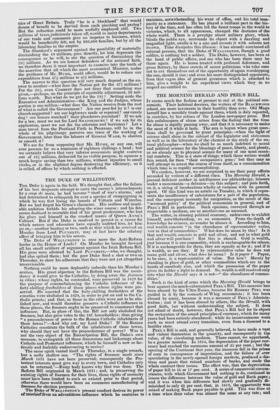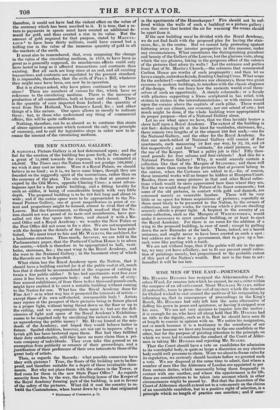THE MORNING HERALD AND PEEL'S mu,.
IT seems much the fashion at present to rail at the political eco- nomists. Their habitual decriers, the writers of the BLACKWOOD school, are more inveterate in their hostility than ever. Old Maga herself has a monthly tirade against them, which is duly repeated, in snatches, by her echoes of the London newspaper press. But this sedulousness of abuse arises from the feeling that the time for abuse is rapidly passing away, and that it is necessary to make the most of it while it lasts. The airs. is begun when great ques- tions shall be governed by great principles—when the light of science shall shine in the cabinet of the legislator and statesman as well as in the laboratory of the chemist or the study of the na- tural philosopher—when we shall be as much indebted to moral and political science for the blessings of peace, liberty, and plenty, as we already are to physical science for many of our most essen- tial comforts. This is a state of things which those writers would fain retard, for then "their occupation's gone;" but they may as well attempt to arrest the course of time itself, as a consummation which time is so rapidly accomplishing.
We confess, however, we are surprised to see their puny efforts seconded by writers of a different class. The Morning Herald, a journal deficient neither in intelligence nor philanthropy, labours under a monomania—a delusion—on this subject; and puts forth, on it, a string of lucubrations wholly at variance with its general spirit. Of this kind was an article on Tuesday, in which it repre- sents the insufficiency of subsistence for a part of the population, and the consequent necessity for emigration, as the result of the "accursed policy" of the political economists in general, and of PEEL'S Bill in particular. Such opinions, conveyed through so respectable a medium, are as mischievous as unsound.
The writer, in abusing political economy, endeavours to exhibit himself, notwithstanding, as an economist. From the depth of knowledge he evinces, no wonder he abuses it. According to him, real wealth consists "in the abundance of representative value, NOT in that of commodities." What does he mean by this? Is it that real wealth consists in gold and silver, and not in what gold and silver will purchase? But this is absurd. Gold is wealth, just because it is one commodity, which is exchangeable for others. If it is exchangeable for them, they are equally so for it; and if it is wealth, so are they. If by representative value he does not mean gold and silver, what does he mean? Is it paper Paper, to be sure, is a representative of value. But how? Merely hi standing in place of gold, or other commodities which are in the hands of somebody else, and which the possession of the paper gives its holder a right to demand. So, wealth is still resolved only into what the Herald says it is not—" the abundance of commo- dities."
Such is the kind of arms which the Morning Herald brings to bear against the much-calumniated PEEL'S Bill. This measure has been abused by the Ultra-Tories, because Sir ROBERT PEEL was guided in it by the counsels of Whig economists ; it has been abused by many, because it was a measure of PEEL'S Adminis- tration ; and it has been abused by others, like the Herald, with good faith, but without understanding the subject. It does not admit of doubt, however, that PEEL'S Bill had for its object the restoration of the sound principles of currency, which for many years had been entirely abandoned; while its inconveniences were such as must attend every transition, even from a diseased to a healthy state. PEEL'S Bill is said, and generally believed, to have made a vast and violent diminution in the quantity, and consequently in the value, of the circulating medium. There cannot, we apprehend, be a greater mistake. In 1814, the depreciation of the paper cur- rency had reached the enormous amount of 25 per cents; but the opening of the Continent that year, the immense fall in the prices of corn in consequence of importation, and the failure of over speculating in the newly-opened foreign markets, produced a tress and panic that ruined numbers of banks, and made the whole contract their issues. The effect was, that the depreciation of paper fell to 16 or 17 per. cent. A series of commercial circum- stances, with which Government had nothing to do, continued to lessen the difference between the value of gold and Bank paper,; and it was when this difference had slowly and gradually di- minished to only 4f, per cent, that, in 1819, the opportunity was seized of making Bank paper payable in gold. This was done at a time when their value was almost the same at any rate; and therefore, it could not have had the violent effect on the value of the currency which has been ascribed to it. It is true, that a re- turn to payments in specie must have created an additional de- mand for gold, and thus created a rise in its value. But the amount of gold required for that purpose, stated by MACCUL- LOCH* to have been thirty millions, could have caused but a trifling rise in the value of the immense quantity of gold in all the markets of the earth.
It must also be remembered, that, even supposing the change in the value of the circulating medium, in 1819, to have been as great as is generally supposed, its mischievous effects could only have lasted so long as it affected transactions and contracts then existing. But all such are long since at an end, and all existing transactions and contracts are regulated by the present standard. It is impossible, therefore, that the evils of PEEL s Bill, whatever they might once have been, can now be in operation.
But it is always asked, why have prices continued so low ever since? There are numbers of causes for this, which have no reference to the circulating medium. There is the increase of production of all commodities, both at home and abroad. There is the quantity of corn imported from Ireland ; the quantity of wool from New Holland, Van Diemen's Land, &c. ; and other things of a like nature. Our space allows us merely to indicate these ; but, to those who understand any thing of commercial affairs, this will be quite sufficient.
Nothing, therefore, can be so absurd as to continue this strain of abuse against a measure which restored the only true principle of currency, and to call for legislative steps in order now to in- crease the amount of the circulating medium.



























 Previous page
Previous page